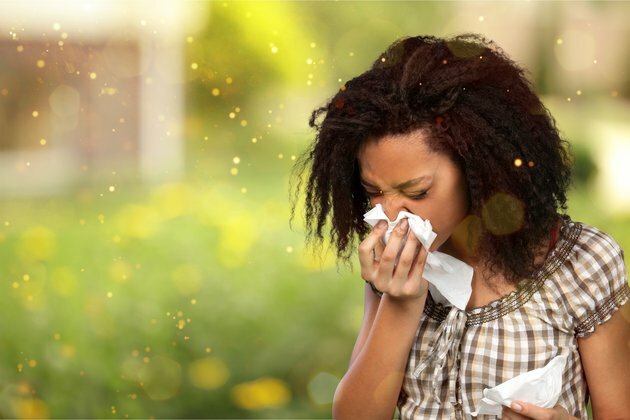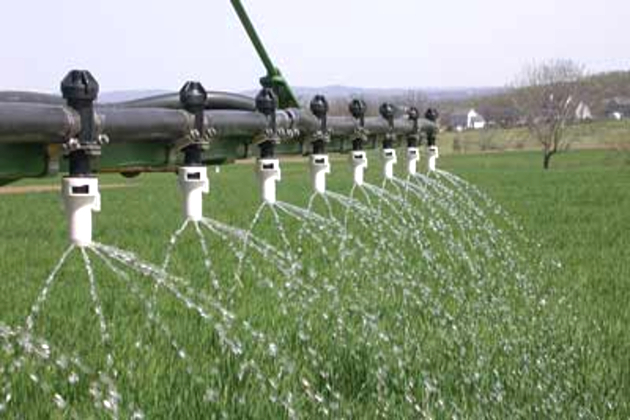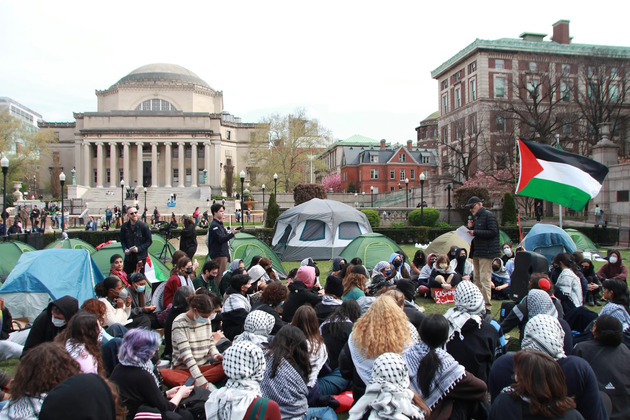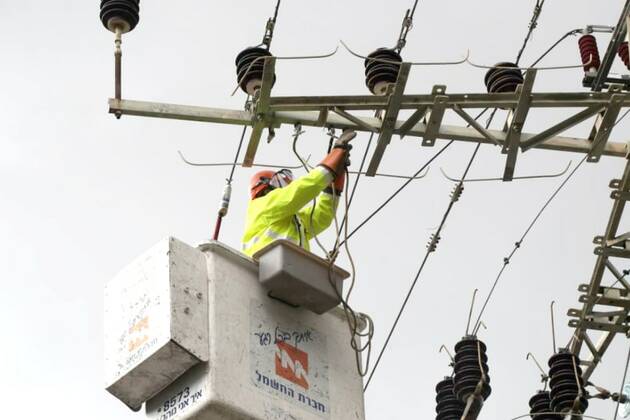Still sneezing? Climate change may prolong allergy season
The Conversation
20 Aug 2019, 02:00 GMT+10

Every year, without fail, summer brings changes to our surroundings: more sunlight, heat, greenness and flowers, among many others. For some people, these changes also mean increasing physical discomfort because along with the flowers, trees and grass comes pollen.
The discomfort caused by pollen can be felt by many people, like watery eyes or a stuffy nose. More often than not, people first turn to the internet to find out what their symptoms mean and to identify some possible options for relief.
At its core, an allergic reaction means that our immune system is overreacting to a foreign particle that may be harmless otherwise. In some cases, the immune system deploys a defence, producing symptoms of airway irritation that resemble a cold, including a runny nose, watering eyes, fatigue and trouble breathing.
Even though the symptoms of an allergic reaction or an asthma attack are mostly felt in the respiratory system, they have been linked to other health conditions like myocardial infarctions and earlier deliveries in pregnant women.
As shown in this Google Trends result, searches for the term "seasonal allergies" in Canada tend to spike around the same dates as the pollen concentrations in the air do: around the third week of April.
Multiple pollen seasons
In our 2018 review of aeroallergens in Canada, we described how pollen seasons for weeds, trees and grasses have different start and end dates. Roughly, the seasons for most of the pollen that cause aches and irritation start around spring, with the exception of weeds - like ragweed - that tend to blossom in late summer.
Plant flowering depends on many environmental factors, such as humidity or minimum temperature, so it's hard to pinpoint a national start date for the pollen seasons. It's more likely that different places will experience pollen seasons that match their particular range of temperatures, flora and other aspects of their geography.
Because pollen concentrations depend so much on the environmental conditions that surround the plant that produces it, many changes in the environment can affect pollen concentrations and pollen seasons.
Climate change is already altering flowering seasons worldwide and in turn, creating longer pollen seasons. The dates that were traditionally considered the start and end of pollen seasons have become obsolete because the seasons are generally starting earlier and ending later.
Currently, in Canada, we breathe pollen for more days than before and, for those of us whose immune systems tend to overreact, we suffer from physical symptoms for longer stretches of time.
In addition to the environmental differences, we must consider individual differences too. Not everyone is affected by pollen in the same degree; for some people, the pollen season might go unnoticed if not for the change in scenery. However, for people whose immune systems have been sensitized to the allergenic proteins in pollen, the increased amounts of pollen in the air triggers very specific symptoms.
The immune system is responsible for our bodies' response to pollen and reacts to perceived threats in a continuum that goes from diminished responses, like in immunocompromised individuals, to no physical reaction and then to heightened responses (allergies).
Because there is no known single cause for the development of allergies, it's impossible to suggest a solution to protect oneself. However, for people who already suffer from allergies, some actions are known to be effective in decreasing the discomfort caused by their symptoms:
Be aware of the pollen concentrations in your area and stay indoors when they are high.
Take a shower or a bath before bedtime in order to avoid inhaling the pollen that might remain in your hair and body after going outdoors.
If you have been diagnosed with allergies (or asthma), or even if you have not been diagnosed but have felt symptoms in the past, schedule a consultation with your primary care provider before pollen season starts. In this appointment you can discuss potential actions to prevent your symptoms and, maybe even plan to use over-the-counter or prescription medications.
Consider allergy testing. This can pinpoint the allergen causing your symptoms and help in the treatment plan your physician will design with you.
Use air conditioners or a high-efficiency particulate air (HEPA) filter in your house, or in the rooms where you spend most of your oftime. These filters have proven to be useful for pollen as well as for the smoke caused during the wildfire season, which in some Canadian cities runs parallel to the last leg of the pollen season.
Even with the changes that climate change is already causing - and will continue to cause in the near future - pollen season still happens every year.
Taking a proactive stance and learning about your allergies and how pollen might affect you is a first step in controlling your symptoms, allowing you a more enjoyable spring, summer and fall outdoors.
Authors: Cecilia Sierra-Heredia - Lecturer, Simon Fraser University | Jordan Brubacher - Research assistant, Simon Fraser University | Tim Takaro - Professor, Associate Dean, Research Health Sciences, Simon Fraser University 
 Share
Share
 Tweet
Tweet
 Share
Share
 Flip
Flip
 Email
Email
Watch latest videos
Subscribe and Follow
Get a daily dose of Iran Herald news through our daily email, its complimentary and keeps you fully up to date with world and business news as well.
News RELEASES
Publish news of your business, community or sports group, personnel appointments, major event and more by submitting a news release to Iran Herald.
More InformationBusiness
SectionVolkswagen to slash 1,600 jobs at Cariad by year-end
BERLIN, Germany: Volkswagen is set to cut 1,600 jobs at its Cariad software division by the end of the year, affecting nearly 30 percent...
Travel to and from Israel to be boosted by terminal reopening
The principal terminal, Terminal 1, at Israel's largest airport will reopen at the end of this month, having largely been closed since...
Tech stocks lead renewed selling on Wall Street
NEW YORK, New York - The knee-jerk introduction of trade tariffs by President Donald Trump continues to rattle markets with all the...
Ford to invest up to $4.8 billion to revive struggling German unit
FRANKFURT, Germany: Ford announced this week that it will inject up to $4.8 billion into its struggling German unit to stabilize its...
Boeing links worker bonuses to company-wide performance
SEATTLE, Washington: Boeing has revamped its employee incentive plan, tying annual bonuses for more than 100,000 workers to overall...
US, Canadian farmers face rising fertilizer costs amid trade tensions
WINNIPEG, Manitoba: Farmers in the U.S. and Canada are bracing for soaring fertilizer prices as trade tensions escalate between the...
Middle East
SectionTravel to and from Israel to be boosted by terminal reopening
The principal terminal, Terminal 1, at Israel's largest airport will reopen at the end of this month, having largely been closed since...
Micro-wineries in Cyprus bring ancient Commandaria wine back to life
NICOSIA, Cyprus: Cyprus' ancient Commandaria wine, praised for its rich heritage dating back nearly 3,000 years, is making a comeback...
Protests mount over detention of Columbia University student
NEW YORK CITY, New York - A student of Columbia University, arrested for protesting against the carnage in Gaza, has been moved out...
Israel cuts off all electricity to Gaza, impacting Palestinians and hostages
Already under siege, the heavily-blockaded Gaza Strip, housing more than two million displaced people, as well as the remaining Israeli...
Decision Time For Iran After Delivery Of Trump Letter
Welcome back to The Farda Briefing, an RFE/RL newsletter that tracks the key issues in Iran and explains why they matter. I'm RFE/RL...
Washington snubs minerals deal with Kiev Ukrainian media
The current proposal could see alterations during an ongoing pause, sources have suggested Senior US officials refused to sign a...












